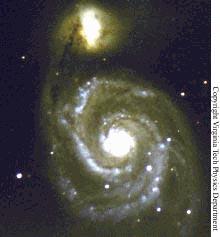 |
 |
|
Philosophy
This
program is founded on the philosophy that undergraduates should not
over specialize too early in a field, such as astronomy, which is
based primarily in advanced research in universities and government
labs. Thus, we expect undergraduate students to remain anchored in
their major fields, such as physics, geology, engineering, etc.,
while pursuing their specific interests. The program is therefore
ideally suited to supplement majors for which astronomy has
relevance. So, for example, the aerospace engineering major would
gain the opportunity to learn more about the environment and setting
in which spacecraft operate, the geology major would gain some
broader understanding of the planets, and the physics major would
develop an awareness of the large scale structure of the universe.
For the undergraduate seriously interested in astronomy as a career
our advice is to major in physics while minoring in astronomy.
Advanced graduate studies in astronomy require first the full
background in physics, on top of which specific knowledge in
astronomy would be a plus. Finally, we welcome those students who
pursue the Astronomy Minor out of pure interest and love of the
subject irrespective of career
concerns. | |
 |
 |
 |
 |
|
 |
 |
|
 |
|
|
|
The
Whirlpool Galaxy (M51), imaged by students Adam Drake, Victor
Gehman, Seth Hornstein, and Chad King. They
used the 0.4 m telescope at the Martin Observatory, which
is located at the Miles C. Horton Sr. Center (a facility of the Mary Moody
Northen Endowment and Virginia
Tech). |
|
|
|
 |
|
|
|
Use this free Java-based
tool to analyze images. It was developed by VT's Dr. John
Simonetti.
Click here to use
SIP. |
| |

